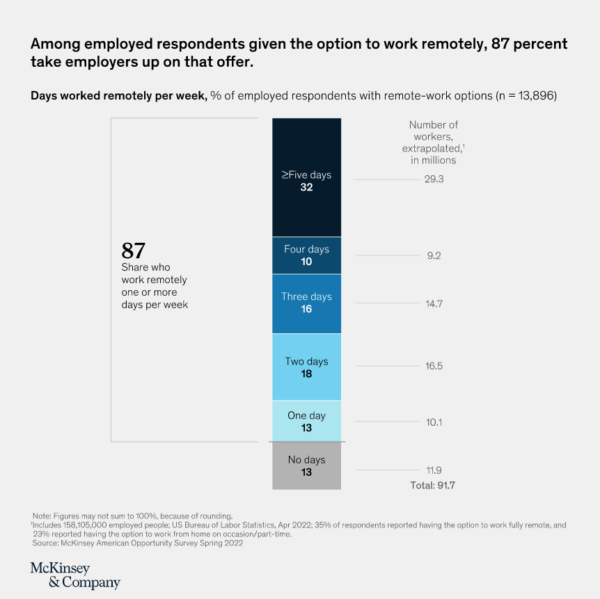The privacy problem with paying for abortion travel, NYC restaurant won’t raise wages after bad review
Check out the City of Austin’s major payroll gaffe and what more remote work means for comms pros.
Hi there, comms connoisseurs.
Let’s explore some notable stories from June 27-July 1, 2022 — and pull out a few timely, tactical takeaways along the way:
1. None of your business: Companies face privacy concerns about paying for abortion travel
Among the many ways organizations are responding to the U.S. Supreme Court’s recent decision to overturn Roe v. Wade, paying travel expenses for employees who have to travel out of their home state to access abortion care is among the most popular.
But some critics — even those who support the policies — have raised concerns about the privacy issues that can arise when companies pay for abortion travel.
Twitter user Willy Blackmore sums it up succinctly:
You absolutely should not have to tell your boss at Dick’s Sporting Goods that you need an abortion
— Willy Blackmore (@willyblackmore) June 25, 2022
“It’s a doomsday scenario if individuals have to bring their health care choices to their employers,” said Dina Fierro, a global vice president at the cosmetics company Nars, echoing a concern that many workers have expressed on social media in recent days.
The Times reports that some companies have integrated travel stipends for abortion care into employees’ health benefits in order to remove the onus from company’s HR team entirely.
“No one at Yelp will ever receive any information on who incurred a claim or received reimbursement,” a Yelp spokesperson told the Times.
If your organization is paying the way for employees who must travel to seek abortions, it’s important that you make employee privacy a top priority. This can mean taking a page out of Yelp’s book and rolling abortion care into benefits, contributing a larger amount to employee health savings accounts or outsourcing the process to a third-party HR or health care services firm.
Communicators should be sure to make clear the steps your organization is taking to protect employee privacy. Your promises to cover abortion care won’t mean much if your employees don’t feel that their privacy is a priority.
2. New York fine dining restaurant scrapped plans to raise wages following bad review
A new report from Business Insider found that the owner of New York City fine dining restaurant Eleven Madison Park acknowledged that paying his employees low wages was discriminatory — but then failed to follow through on raising the restaurant’s minimum wage to $20 an hour.
Daniel Humm, chef and owner of Eleven Madison Park, wrote in an unpublished op-ed piece that he realized $15 an hour was keeping women and people of color from having opportunities in his kitchen.
“I didn’t pay enough attention to the fact that, by paying low wages, I was unintentionally excluding so many from my kitchen,” Humm wrote in the op-ed, which he hoped to pitch to The New York Times. “Today, I realize that countless people, especially many women and people of color, were never able to become chefs because they couldn’t work such long hours for so little money.” The text of the op-ed was leaked to Business Insider.
In the piece, Humm proposed raising the restaurant’s minimum wage to $20 per hour. But after the op-ed went unpublished and Eleven Madison Park received a scathing review from Times food critic Pete Wells, the plan fell by the wayside.
In January, Eleven Madison Park got rid of its no-tipping policy bringing the price of its tasting menu to $863 for two diners after tax and a 20 percent tip. The move increased some employees’ wages, but the $20 minimum hourly wage never went into effect.
Now, Business Insider reports, former employees say the restaurant has devolved into a “shit show.”
Communicators often refer to the concept of “walking the talk,” or backing up your words with actions. This is a perfect example of doing the exact opposite. If your organization can internally acknowledge that something is wrong with the way you’re treating your employees, it’s your ethical obligation (and business imperative) to take action. Otherwise, you risk losing your workers when they realize you’ve been holding out on them.
3. City of Austin fails to pay 30+ employees for a month of work
More than 30 employees with the City of Austin’s Parks and Recreation Department have gone without pay for as long as one month due to a payroll error.
This isn’t the first employer branding-related struggle the city has faced — the parks and rec department also recently struggled to find seasonal workers, especially lifeguards for the public pools.
One employee said his paycheck was more than a month late and “he had trouble paying his car payment.”
“Some of these employees are missing a substantial amount of hours 50-80 hours but others are missing 13 or less hours,” Ginny McDonald, a manager in the City of Austin’s payroll department, wrote on an internal messaging system last week.
According to a list of 21 employees who had gone without pay, the city owed an average of $763 to each worker; one employee, who is listed as working for the city’s pools, was owed nearly $1,500 for more than 90 hours of work.
“The Department recognizes people depend on their checks for their livelihoods,” John Nixon, a spokesperson for the Parks and Recreation Department, told KUT in an email. “The Department sincerely apologized for the error and has reviewed internal processes to help prevent any future errors.”
The spokesperson said the city attempted to make up for the error by giving affected employees $150 gift cards and “certificates of appreciation.”
The department was aware of the issue several weeks before it was resolved:
“I know this is a huge ask but some of these employees are desperate and need their pay,” Al Carmona, a supervisor for the city’s Parks and Recreation Department, wrote on June 16 to an employee in the payroll department.
The problem wasn’t resolved until more than a week later, when city staff wrote they would hand-deliver paychecks to employees on June 23; some people should have received paychecks as far back as May 27.
Now the City of Austin is not only dealing with a worker shortage, but a PR problem as well.
If your organization is struggling with employer branding — and failing to fill positions — engaging your current employees to figure out what it takes for them to be happy should be your No. 1 priority.
Comms pros should identify and work to resolve internal issues like these as quickly as possible, before they become a bigger issue that will affect the organization as a whole.
4. McKinsey report finds 92 million Americans have option to work remotely
New data from management consulting firm McKinsey shows that most people will work remotely or with a hybrid schedule when given the opportunity.

Eighty-seven percent of workers surveyed by McKinsey said that they embrace the opportunity to work remotely, when possible.
“People offered full-time flexible work spent a bit more time working remotely, on average, at 3.3 days a week,” the report says. “Interestingly, 12 percent of respondents whose employers only offer part-time or occasional remote work say that even they worked from home for five days a week.”
Workplace tech experts have acknowledged that the remote work boom has required companies to up the ante with their digital engagement and communication tools.
“Platforms like Zoom were excellent for businesses as a temporary pandemic solution, but like an impromptu medical tent, a temporary solution should not be permanent,” says Adam Riggs, Frameable CEO and former Shutterstock president. “Just as an office building or airport is designed, purpose-built virtual spaces should be beautiful, functional, inspiring, and wellness-aware; sweaty headsets and vanilla meeting platforms are not realistic solutions.”
Consider evaluating your organization’s remote work benefits and policies. Are there areas where you could better support your hybrid and comms workers through new software, a tech stipend or engagement programs? More than two years into COVID-19, if you haven’t taken a second look at how your employees are working remotely, you may be missing an opportunity to improve employee experience.
5. How about some good news?
This week, let’s draw inspiration from:
- A University of Arizona study that suggests the smell of desert rain might be good for your health. To Joshua Tree we go!
- The fact that NPR’s “Book We Love” is back — and early.
- The story of how a British man planted a giant sequoia and offset his carbon footprint for life.
- Ragan Training, which is an incredible resource for communication inspiration and education.
- You also deserve an award. Get your due here!
Take good care of yourselves, comms champions, and keep up the good work.
COMMENT
Ragan.com Daily Headlines
RECOMMENDED READING
Tags: crisis response







